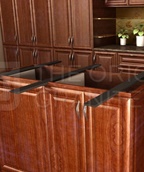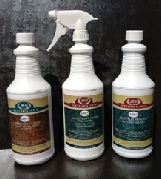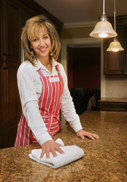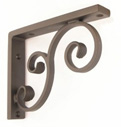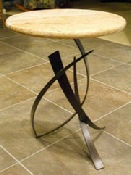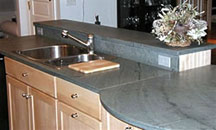
Slate countertops are the hardest countertops. Yet they are seldom seen in kitchens. Of course, outside the kitchen, slate is well known as a strong and sturdy building material used on floors and roofs.
As a countertop, it is quite durable and offers a look that ranges from rustic to classy.
Consider slate tops as an alternative to granite or limestone countertops. It’s durable and unique in the kitchen.
Slate Countertop Colors
Slate comes in these colors . . . dark to light green, mottled purple, deep purple/turquoise, red, gray, and black. Its surface is usually honed matte finish.
You can also recognize it by its natural cleft surface. The cleft slate countertop surface is not suitable for most counter applications.
A slate countertop cannot be polished to a shine because it’s too soft.
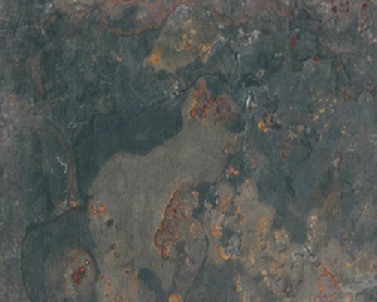
What is slate?
Slate is a metamorphic stone derived from sedimentary shale and clay. It formed on ancient sea beds. Essentially, it’s compacted mud. It is a siliceous stone, like granite, and will not react to acids (vinegar, lemon juice).
Slate is perhaps the strongest material you can use for a kitchen countertop. Its extremely low absorption rate even beats granite countertops. And most slates are considered stain-
Like granite, slate is heat resistant. You can’t hurt it or discolor it with hot items. Slate is soft and will scratch. Because it’s soft you can lightly sand the scratches to remove them or you can leave them and enjoy the natural character of the stone.
Keep in mind slate comes from smaller slabs than granite which means you will have more seams in your countertops. Slate countertop prices should compare favorably with granite. And even though slate tops are fabricated similarly to granite tops, your fabricator may not be accustomed to working with the material. Be sure you ask for their familiarity with slate. See Stone Fabricators for more.
If you want a quiet, elegant, nature-
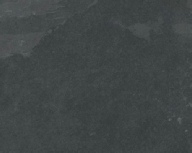

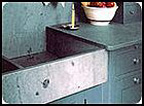
Slate Countertops Pros and Cons
Slate, like granite and soapstone, is a siliceous stone and is not affected by acids. It’s nearly indestructible. You can put hot trays and pans directly on it without any problem. It’s probably the strongest natural stone you can use as a countertop.
Because of its low absorption rate, slate never needs sealing and stains won’t penetrate. It is heat resistant and won’t react to household chemicals or cleaners.
How To Clean Slate Countertops
Cleaning slate countertops should only be done with specialized cleaners, not Windex or ammonia. The best performing product for slate cleaning is MB Stone Care MB-
In fact, MB-
Limestone Countertops . . . where to use them
Marble Countertops . . . why do they stain?
Onyx Countertops –
Soapstone Counters . . . better than granite
Return to Countertop Materials

